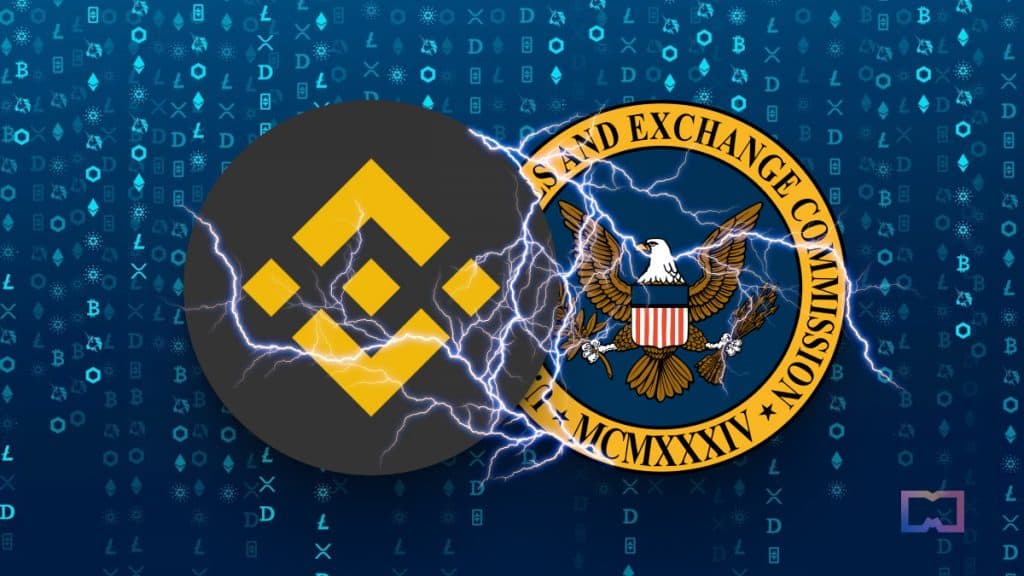Binance vs SEC: Battle for Crypto Freedom or a Fight for Regulatory Compliance?


In Brief
The outcome of Binance Vs SEC case could have significant implications for the future of the crypto industry and its regulation in the U.S. and beyond.

Binance, the world’s largest cryptocurrency exchange by trading volume, is facing a legal challenge from the U.S. Securities and Exchange Commission (SEC), which accused it of violating securities laws and defrauding investors.
Binance and its CEO, Changpeng Zhao, filed court papers seeking to dismiss the lawsuit, claiming that the SEC has no jurisdiction over their activities and that they have complied with all applicable laws. However, the SEC has not given up on its pursuit of Binance, and has recently requested access to Binance.US’s software and documents, which was denied by a U.S. court.
The outcome of this case could have significant implications for the future of the crypto industry and its regulation in the U.S. and beyond.
How the Case Unfurled
The SEC’s Allegations The SEC’s lawsuit against Binance, Binance.US, and Zhao was filed in June 2023, following a months-long investigation into the exchange’s operations. The SEC alleges that Binance and Zhao engaged in a series of securities law violations, including:
- Operating unregistered national securities exchanges, broker-dealers and clearing agencies in the U.S. — without complying with the registration, reporting and record-keeping requirements of the federal securities laws.
- Offering and selling unregistered securities to U.S. investors, including Binance’s own crypto assets such as BNB, BUSD, crypto-lending products and staking-as-a-service programs.
- Misrepresenting the nature and extent of their activities in the U.S., and subverting their own controls to secretly allow high-value U.S. customers to trade on Binance.com, which is not authorized to operate in the U.S.
- Misleading investors and regulators about the independence and oversight of Binance.US, which is allegedly controlled by Zhao and Binance behind the scenes.
- Commingling investor funds with their own funds and diverting them to third parties owned by Zhao, such as Sigma Chain and Merit Peak Limited.
- Engaging in manipulative trading practices that artificially inflated the trading volume and prices of crypto assets on Binance.US.
The SEC seeks injunctive relief, disgorgement of ill-gotten gains, civil penalties and permanent bans on Binance and Zhao from engaging in any securities-related activities in the U.S.
Binance’s Defense Binance and Zhao have denied the SEC’s allegations and have filed motions to dismiss the lawsuit. They argue that the SEC has no authority or jurisdiction over their activities, and they have complied with all applicable laws. They contend that:
- The SEC has failed to provide any clear or consistent guidance on what constitutes a security or a securities-related activity in the crypto space, and has attempted to retroactively apply its vague and ambiguous rules to Binance and Zhao.
- The SEC has failed to show that Binance or Zhao have any substantial contacts or connections with the U.S., or that they have targeted or solicited U.S. investors in any way.
- The SEC has failed to prove that any of the crypto assets offered or sold by Binance or Zhao are securities under the federal securities laws, or that they have any characteristics or features of securities.
- The SEC has failed to establish that Binance or Zhao have operated any unregistered national securities exchanges, broker-dealers, or clearing agencies in the U.S., or that they have performed any functions or services that require such registration.
- The SEC has failed to demonstrate that Binance or Zhao have made any false or misleading statements or omissions to investors or regulators, or that they have engaged in any fraudulent or manipulative conduct.
Binance.US’s Response Binance.US, which is formally known as BAM Trading Services Inc., has also filed a motion to dismiss the charges against it.
It claims that it is a separate and independent entity from Binance and Zhao, and that it operates a fully compliant and regulated crypto trading platform in the U.S. It asserts that:
- It has obtained a money services business license from FinCEN, a money transmitter license from NYSDFS, and a virtual currency license from NYDFS.
- It has registered as a money services business with FinCEN
- It has implemented robust anti-money laundering, know-your-customer, and cybersecurity policies and procedures, and has engaged independent auditors to verify its compliance.
- It has obtained approval from the SEC to list and trade certain crypto assets that are deemed securities, such as Grayscale Bitcoin Trust and Grayscale Ethereum Trust.
- It has cooperated fully with the SEC’s investigation and has provided all the requested information and documents, except for those that are protected by attorney-client privilege or trade secrets.
Binance.US argues that the SEC’s lawsuit is based on unfounded allegations and irrelevant evidence, and that it should be dismissed for lack of merit and jurisdiction.
The SEC’s Request for Inspection In a bid to bolster its case against Binance, the SEC has sought to inspect Binance.US’s software and documents, claiming that they are relevant and material to its investigation. The SEC asserts that:
- Binance.US’s software and documents may reveal the extent and nature of Binance and Zhao’s involvement and control over Binance.US, as well as their access to Binance.US’s customer data and funds.
- Binance.US’s software and documents may show how Binance.US’s platform operates, how it determines the eligibility and availability of crypto assets, how it executes trades and transfers, and how it handles customer complaints and disputes.
- Binance.US’s software and documents may demonstrate whether Binance.US has complied with the federal securities laws and regulations, or whether it has engaged in any securities law violations or fraudulent conduct.
The SEC has requested access to Binance.US’s source code, user interface, application programming interface, database schema, data dictionary, technical specifications, user manuals, policies and procedures, contracts and agreements, correspondence and communications, financial statements, audit reports and other relevant records.
However, the SEC’s request for inspection was denied by a U.S. district court judge in New York. The judge ruled that:
- The SEC’s request was overly broad, burdensome, and intrusive, as it sought to obtain virtually all of Binance.US’s software and documents without specifying their relevance or necessity.
- The SEC’s request was premature, as it had not exhausted other less intrusive means of obtaining the information it sought, such as interrogatories, depositions, or subpoenas.
- The SEC’s request was disproportionate to the needs of the case, as it would impose significant costs and risks on Binance.US, while providing little or no benefit to the SEC.
- The SEC’s request was unjustified, as it had not shown any reasonable basis or probable cause to believe that Binance.US’s software and documents contained any evidence of securities law violations or fraudulent conduct.
The judge concluded that the SEC had failed to meet its burden of showing that its request for inspection was relevant, material, necessary, reasonable, or proportional to the issues in dispute. The judge also noted that granting the SEC’s request would violate Binance.US’s privacy rights and trade secrets protections.
Implications of SEC’s Ruling
The court’s denial of the SEC’s request for inspection is a significant setback for the SEC in its lawsuit against Binance. It indicates that the court is not convinced by the SEC’s arguments or evidence, and that it is not willing to grant the SEC unlimited access to Binance.US’s software and documents. It also suggests that the court is sympathetic to Binance.US’s defense and claims of compliance.
However, the court’s denial does not mean that the SEC’s lawsuit is over. The SEC may still pursue other means of obtaining information from Binance.US or other parties. The SEC may also appeal the court’s decision or file a revised request for inspection. The SEC may also present other arguments or evidence to support its allegations against Binance.
The outcome of this case could have significant implications for the future of the crypto industry and its regulation in the U.S. and beyond. If the SEC prevails in its lawsuit against Binance, it could set a precedent for cracking down on other crypto platforms that operate in or target U.S. investors without complying with U.S. securities laws. It could also deter innovation and competition in the crypto space by imposing stringent requirements and restrictions on crypto platforms.
On the other hand, if Binance succeeds in dismissing the lawsuit or reaching a settlement with the SEC, it could signal a victory for crypto freedom and innovation. It could also encourage more dialogue and cooperation between crypto platforms and regulators to foster a more conducive and compliant environment for crypto development.
In any case, this case is likely to shape the future of crypto regulation in the U.S. and beyond. It will test the limits of the SEC’s authority and jurisdiction over crypto assets and activities. It will also challenge the definitions and classifications of crypto assets as securities or non-securities. It will also highlight the need for clear and consistent guidance and rules for crypto platforms and investors.
This case is not only a legal battle between Binance and the SEC. It is also a fight for crypto freedom or a fight for regulatory compliance. It is a fight that will have profound implications for the crypto industry and society.
Disclaimer
In line with the Trust Project guidelines, please note that the information provided on this page is not intended to be and should not be interpreted as legal, tax, investment, financial, or any other form of advice. It is important to only invest what you can afford to lose and to seek independent financial advice if you have any doubts. For further information, we suggest referring to the terms and conditions as well as the help and support pages provided by the issuer or advertiser. MetaversePost is committed to accurate, unbiased reporting, but market conditions are subject to change without notice.
About The Author
Anndy Lian is an all-rounded business strategist in Asia. He has provided advisory across a variety of industries for local, international, public listed companies and governments. He is an early blockchain adopter and experienced serial entrepreneur, best-selling book author, investor, board member, and keynote speaker.
More articles

Anndy Lian is an all-rounded business strategist in Asia. He has provided advisory across a variety of industries for local, international, public listed companies and governments. He is an early blockchain adopter and experienced serial entrepreneur, best-selling book author, investor, board member, and keynote speaker.



















































